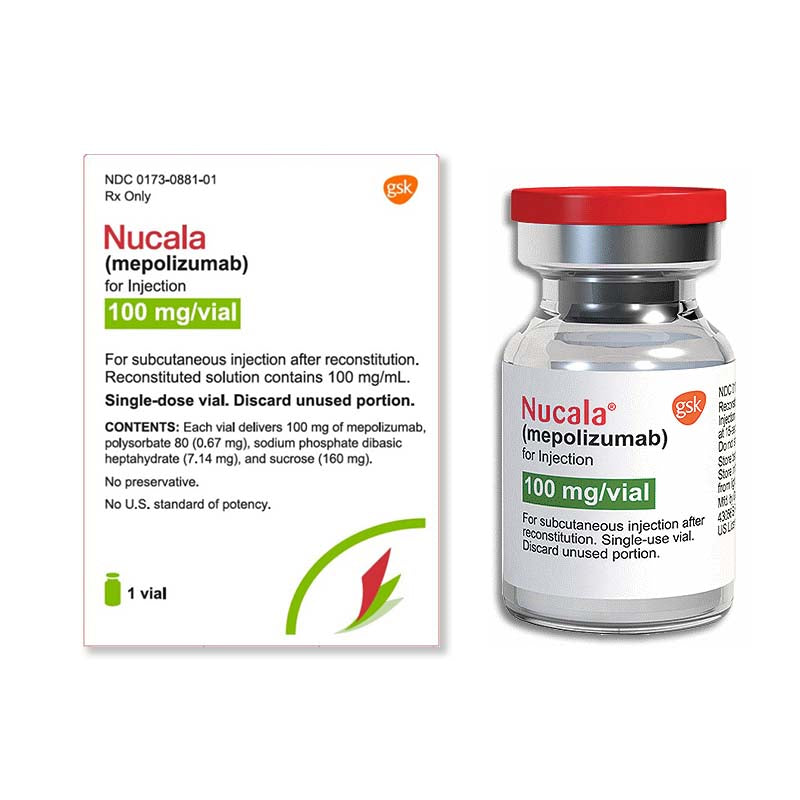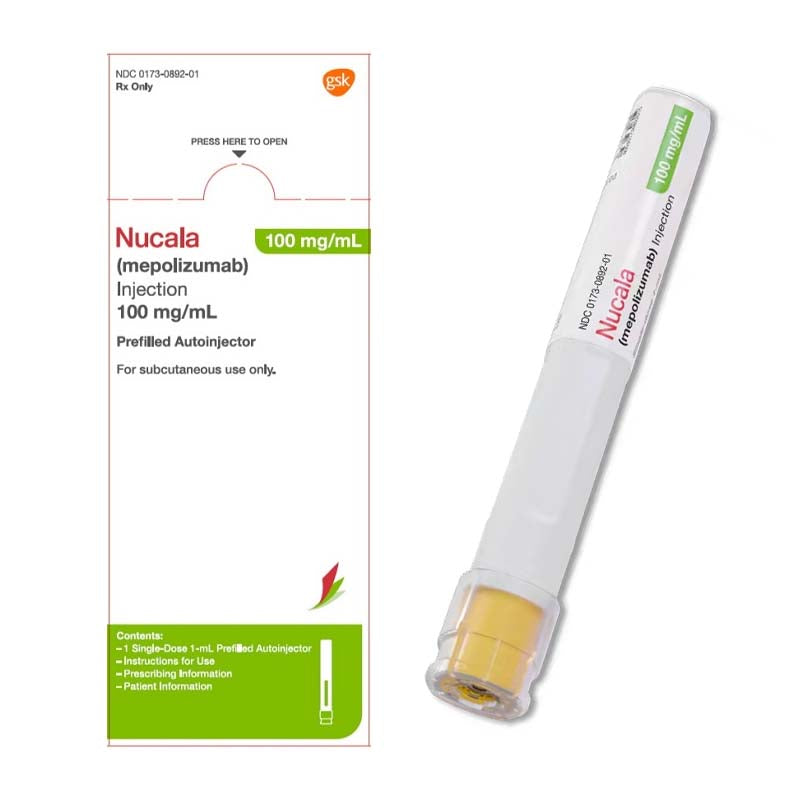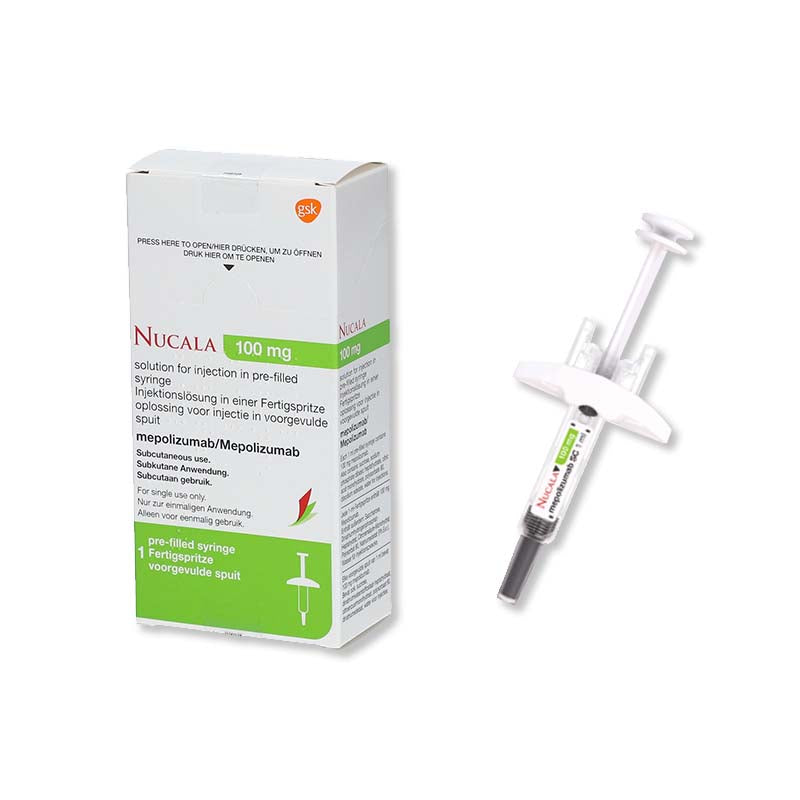GLAXO-SMITH KLINE
NUCALA (Mepolizumab)
NUCALA (Mepolizumab)


Couldn't load pickup availability
What is this medication?
Nucala is a monoclonal antibody that works by reducing levels of eosinophils (a type of white blood cell). High eosinophil levels can contribute to certain disorders.
Nucala is used together with other medicines to help control severe asthma in adults and children who are at least 6 years old. Nucala is not a rescue medicine for asthma attacks.
Nucala is used together with other medicines for the treatment of chronic rhinosinusitis with nasal polyps (CRSwNP) in adults whose disease is not controlled with nasal corticosteroids. Nucala helps reduce nasal congestion, nasal discharge, mucus in the throat, and loss of smell associated with CRSwNP, helps reduce the size of your nasal polyps and the use of oral corticosteroid medicines, and helps prevent surgery for your nasal polyps.
Nucala is used in adults to help control symptoms and reduce flares of a rare autoimmune disorder called eosinophilic granulomatosis with polyangiitis (EPGA).
Nucala is also used to help prevent flare-ups or reduce symptoms of high eosinophil levels (hypereosinophilic syndrome, or HES) in adults and children at least 12 years old.
Nucala is given every four weeks by subcutaneous injection.
How should I use this medication?
Nucala is not a rescue medicine for asthma attacks. Use only fast-acting inhalation medicine for an attack. Seek medical attention if your breathing problems get worse quickly, or if you think your asthma medications are not working as well.
Nucala is injected under the skin, usually once every 4 weeks. A healthcare provider may teach you how to properly use the medication by yourself. Follow all directions on your prescription label and read all medication guides or instruction sheets.
Your doctor may perform blood tests to make sure you do not have conditions that would prevent you from safely using Nucala.
Nucala powder must be mixed with a liquid (diluent) before using it. Read and carefully follow any Instructions for Use provided with your medicine. When using injections by yourself, be sure you understand how to properly mix and store the medicine.
Gently swirl but do not shake the mixed medicine. Prepare an injection only when you are ready to give it. Do not use Nucala if the medicine has changed colors or has particles in it. Call your pharmacist for new medicine.
Store the vial (bottle) in its original carton at room temperature. Protect from light and do not freeze.
Store the prefilled syringe or autoinjector in the original carton in a refrigerator. Do not freeze or shake the medicine. After removing the medicine from the carton, you must use the syringe or autoinjector within 8 hours.
You may store the prefilled syringe or autoinjector in the unopened carton at room temperature for up to 7 days. Throw away a syringe or autoinjector left out of the refrigerator for more than 7 days.
Each vial, prefilled syringe, or autoinjector is for one use only. Throw it away after one use, even if there is still medicine left inside.
Use a needle and syringe only once and then place them in a puncture-proof "sharps" container. Follow state or local laws about how to dispose of this container. Keep it out of the reach of children and pets.
Dosing information:
Usual Adult Dose for Asthma - Maintenance:
- 100 mg subcutaneously every 4 weeks
Use: Add-on maintenance treatment of severe asthma with an eosinophilic phenotype
Comments:
- This drug should be administered in the upper arm, thigh, or abdomen.
Usual Adult Dose for Chronic Rhinosinusitis with Nasal Polyps:
- 100 mg subcutaneously every 4 weeks.
Use: Add-on maintenance treatment of adult patients 18 years and older with chronic rhinosinusitis with nasal polyps (CRSwNP)
Comments:
-This drug should be administered in the upper arm, thigh, or abdomen.
Usual Adult Dose for Eosinophilic Granulomatosis with Polyangiitis (EGPA):
- 300 mg (as 3 separate 100 mg injections) subcutaneously every 4 weeks
Comments:
- This drug should be administered in the upper arm, thigh, or abdomen as 3 separate 100 mg injections at least 5 cm (approximately 2 inches) apart if more than 1 injection is administered at the same site.
Use: For eosinophilic granulomatosis with polyangiitis (EGPA)
Usual Adult Dose for Hypereosinophilic Syndrome (HES):
- 300 mg (as 3 separate 100 mg injections) subcutaneously every 4 weeks
Use: treatment of hypereosinophilic syndrome (HES) for ≥6 months without an identifiable non-hematologic secondary cause.
Comments:
- This drug should be administered in the upper arm, thigh, or abdomen as 3 separate 100 mg injections at least 5 cm (approximately 2 inches) apart if more than 1 injection is administered at the same site.
Usual Pediatric Dose for Asthma - Maintenance:
- 6 to 11 years:
40 mg subcutaneously every 4 weeks
- 12 years or older:
100 mg subcutaneously every 4 weeks
Comments:
- This drug should be administered in the upper arm, thigh, or abdomen.
Use: Add-on maintenance therapy for severe asthma with an eosinophilic phenotype in children 6 years and older
Comments:
- This drug should be administered in the upper arm, thigh, or abdomen.
Usual Pediatric Dose for Hypereosinophilic Syndrome (HES):
- 300 mg (as 3 separate 100 mg injections) subcutaneously every 4 weeks
Use: treatment of pediatric patients aged 12 years and older with hypereosinophilic syndrome (HES) for ≥6 months without an identifiable non-hematologic secondary cause
Comments:
- This drug should be administered in the upper arm, thigh, or abdomen as 3 separate 100 mg injections at least 5 cm (approximately 2 inches) apart if more than 1 injection is administered at the same site.
What if I miss a dose?
Use the medicine as soon as you can, but skip the missed dose if it is almost time for your next dose. Do not use two doses at one time.
How should I store this medication?
Store the vial (bottle) in its original carton at room temperature. Protect from light and do not freeze.
Store the prefilled syringe or autoinjector in the original carton in a refrigerator. Do not freeze or shake the medicine. After removing the medicine from the carton, you must use the syringe or autoinjector within 8 hours.
You may store the prefilled syringe or autoinjector in the unopened carton at room temperature for up to 7 days. Throw away a syringe or autoinjector left out of the refrigerator for more than 7 days.
What should I avoid while using Nucala?
Follow your doctor's instructions about any restrictions on food, beverages, or activity.
What are the possible side effects of using this medication?
Get emergency medical help if you have signs of an allergic reaction to Nucala: hives, rash; wheezing, chest tightness, difficult breathing; feeling like you might pass out; swelling of your face, lips, tongue, or throat.
Call your doctor at once if you have:
- unusual pain or tiredness;
- burning or tingling anywhere in your body; or
- a red or blistering skin rash.
Common Nucala side effects may include:
- headache;
- feeling tired;
- back pain; or
- pain, swelling, redness, burning, or itching where the medicine was injected.
This is not a complete list of side effects and others may occur. Call your doctor for medical advice about side effects. You may report side effects to FDA at 1-800-FDA-1088.
What other drugs will affect Nucala?
Tell your doctor about all your current medicines and any you start or stop using, especially:
- an oral (taken by mouth) or inhaled steroid medicine.
Other drugs may interact with mepolizumab, including prescription and over-the-counter medicines, vitamins, and herbal products. Tell each of your health care providers about all medicines you use now and any medicine you start or stop using.






